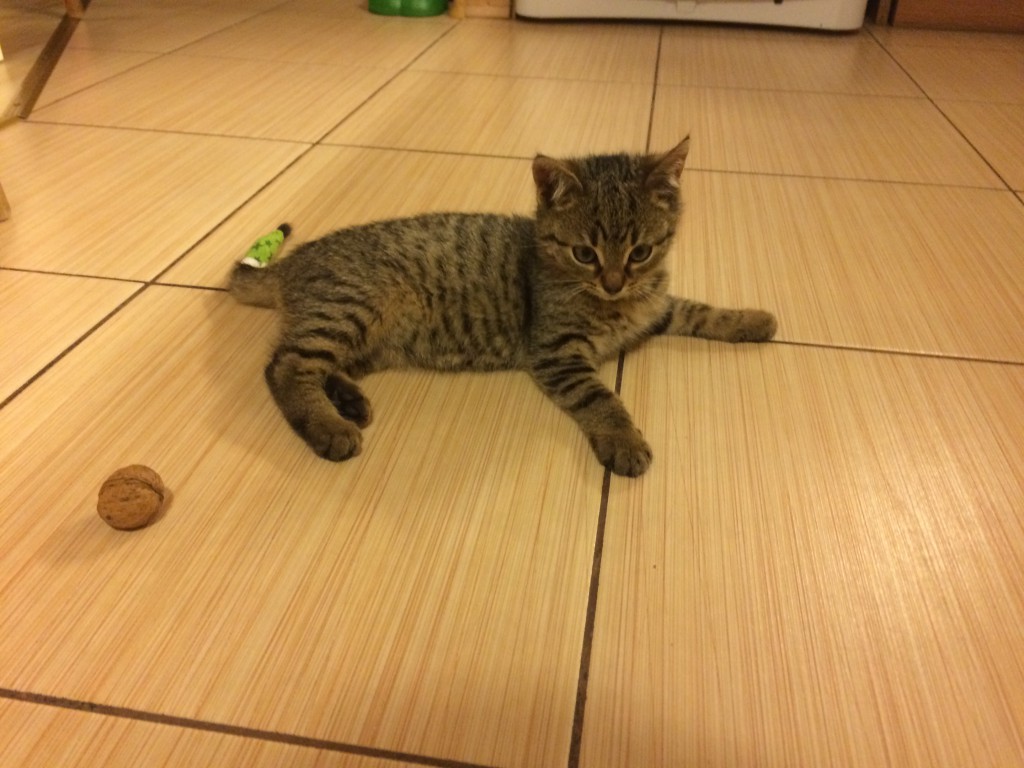Three months ago, I found myself facing an important question: did I want a cat?
My sister-in-law found a poor kitty on the street, without a home and a wounded tail (aaah…). After a day of reflection and rushed research in the question how to take care of a kitty, we decided to take him in. Since that moment, we are proudly housing Rembrandt – I negotiated the right to name him and to pick a Dutch name. We hope to do so for the next fifteen odd years.
Rembrandt is a pretty social kitten. He likes to lay on the couch with us and enjoys to play. He has grown tremendously in the short time he has been with us. If only we figured out how to teach him to leave the plants alone…
As a happiness blogger, I am not just going to share cat pictures or cat memes, though I take it that’s one of the main functions of the internet. So let me face these questions: do cats, and other animals, make us happier? And a more complicated one: do animals themselves experience happiness?
Is happiness a warm kitty?
Amazingly, almost every single question about happiness I could come up with has been answered by a scientist. To answer whether animals make us happy, I looked at the result of a small study published by Bao et al. under the title “Is Happiness a Warm Puppy?: Examining the Association Between Pets and Well-Being”. Based on a survey under 263 people, among which 94% pet owners (of which 53% dogs and 41% cats), Bao et al. find a slightly higher level of life satisfaction for pet owners.
Although the survey numbers may be too small to draw strong conclusions, intuitively the findings make sense. Human beings need both social relations with other beings and a purpose to feel happiness. Having a pet could enrich human lives in both ways
Bao et al.’s study also looks into a trickier issue: cats or dogs? Dog owners were found to be happier than cat owners, and again, intuitively this makes sense. Cats are more isolated and independent animals, while dogs display a lot more affection. Also, dogs require to be walked, and people with more active lifestyles and time in nature are happier. The study – again, based on a small sample – even found higher levels of conscientiousness in dog owners and higher levels of neuroticism in cat owners. Scientists have found neuroticism to be a personality trait that is correlate with lower levels of happiness.
Do animals experience happiness?
And what about animals themselves: does Rembrandt love me? Does he experience happiness when he’s purring on my stomach and I am petting him? We are always warned not to project human emotions upon animals, but that does not mean animals do not have feelings. Even Darwin already asserted that animals have emotions.
To measure human happiness, scientists use surveys as well as brain research. In case of animals, surveys do not make sense – I cannot ask Rembrandt to fill out a questionnaire asking him to value his health, social relations, quality of food and shelter, and overall life satisfaction. Brain research in animals has confirmed that animals have broadly similar cerebral systems. Even the frontal cortex, said to be the determining factor in human progression over animals, may not be as sacred anymore.
Indeed, the more complex animals’ brains are, the less their behaviours are hard-wired in intuition, and the larger and more complex their brains are, the more space there is for emotional systems to influence animals’ behaviour. We can watch animals – including Rembrandt – and observe their behaviour, and infer something about how they feel.
As Carl Safina says in his TED talk “What animals are feeling and thinking“,
“attributing human thoughts and emotions to other species is the best first guess about what they’re feeling”
As such, I can be confident that Rembrandt feels positive emotions – be it calm, pleasure, or even happiness – in my presence.



